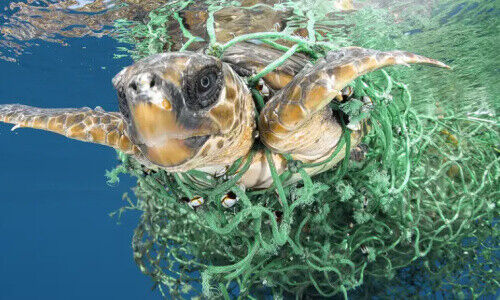The Swiss government is subtly upping the pressure on asset managers to stop «greenwashing». Its timeline is hugely ambitious – meaning it is make-or-break for asset managers and their ESG strategies.
A sea turtle trapped in a snarled fishing net – alongside the message «Can a bank help with sustainability? We’re on it.» Pitching green, social, or good governance investments is big business in Switzerland.
The market for so-called ESG financial products has surged more than seven-fold to 1.52 trillion Swiss francs ($1.65 trillion) in the last five years, according to a joint study by Swiss Sustainable Finance and the University of Zurich published in June.
Top-Tier Confab
This week, big money, policy- and lawmakers like Swiss finance minister Ueli Maurer, non-profit groups, and United Nations representatives including deputy secretary general Amina Mohammed are convening at a sustainable investment conference in Geneva (the city however lost out to Frankfurt on a sustainability hub).
Swiss finance has zeroed in on the climate aspect, largely eschewing the social and governance issues. The problem is separating the wheat from the chaff in an increasingly crowded industry – so much so that supervisors are intervening.
Bern's Tight Timeline
The «ESG» label matters because Switzerland has staked much of the future of its financial center on credibly selling these products to international investors. The Swiss government gave the industry a short timeline to figure out how to root out greenwashers among its own.
It wants the finance ministry «to propose by the end of 2022 how financial market legislation could be amended – particularly with regard to transparency – in order to avoid greenwashing,» it said in a wider sustainability plan set out two weeks ago.
In effect, the government isn’t happy with that industry has been doing until now. Swiss Sustainable Finance, to which most companies in the sector belong, is running a pilot scheme that aims to increase the transparency of such products.
Undermining Client Confidence
Switzerland’s financial regulator, Finma, plans more on-site sustainability inspections following a handful of checks focusing on asset management earlier this year, it told finews.com in September.
Family offices and other private wealth managers are starting to more systematically respond to the momentum from clients as well as from governments to pose critical questions about impact, Falko Paetzold told finews.com.
«The industry is struggling with this – both in terms of defining what impact is as well as how to execute and communicate it,» said Paetzold, who is an assistant professor at EBS University as well as the head of the Center of Sustainable Finance and Private Wealth at the University of Zurich.
EU Rules Vs Swiss Self-Regulation
The U.S. is investigating Deutsche Bank-owned fund house DWS following a company whistleblower, underscoring the potential pitfalls. The Swiss government’s stance raises the pressure on industry to act – before it is acted on.
It also puts it closer to the approach taken by the European Union, which in summer revealed plans to tighten measures on banks and rating agencies over greenwashing. Swiss finance exports roughly one-third of ESG products, chiefly into the EU.
Regulating Blindly
Switzerland’s Asset Management Association (AMAS) on Friday proposed minimum requirements on transparency for ESG products – a first attempt to wrangle an industry that ranges from boutiques like Robeco to giants like Blackrock and UBS.
Compiled in conjunction with Swiss Sustainable Finance, the AMAS recommendations are however neither binding or internationally coordinated. The government is asking industry to self-regulate somewhat blindly: there is no existing legal basis for ESG products this far, besides general investor protection.
Product Labeling?
There are also disagreements about how ESG is classified (taxonomy), tax treatment of such products, or – most crucially – how to measure their impact. «The operational issue – banks struggling to reflect the effect of ESG products in client portfolios – is not trivial as well,» Paetzold said.
To lend credibility to ESG’s effectiveness, Switzerland’s government will propose a quality label-system and disclosure over how much of a contribution products are making in halting the rise in global temperature, according to Swiss weekly «Sonntagszeitung» (behind paywall, in German) .This mirrors a key target in the UN’s goals decided in Paris six years ago.
Emotive Imagery Vs Measurability
Realistically, asset managers have roughly six months to agree and pitch to the government. While finance won’t shy from restricting itself, «there will surely be very intense discussion between us and the authorities,» Switzerland’s top banking lobbyist Joerg Gasser told «L’Agefi» (behind paywall, in French) last week.
Credit Suisse, which has staked a huge part of its strategy on sustainable investments, ran the sea turtle advertisement as an emblem for its sustainable finance effort. Could the Swiss bank withstand scrutiny over how much of the campaign represents emotive imagery and how much is measurably fighting climate change?




































